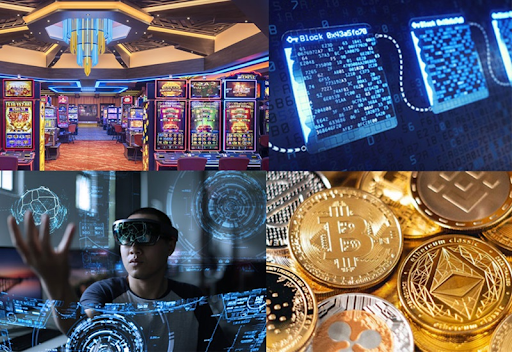The world of online casinos has evolved far beyond simple web-based games of chance. Behind the thrilling spins, flashing lights, and seamless gameplay lies a deep web of engineering innovation — from real-time data processing and server optimization to encryption protocols and sensory design. Engineering doesn’t just build the backbone of online casinos; it shapes the very experience that keeps millions of players engaged worldwide.
In the past, casino games were designed purely by mathematicians and game developers. But as the industry grew into a multi-billion-dollar digital ecosystem, engineers stepped in to make everything faster, safer, and more immersive. Today, engineers are responsible for the algorithms that determine fairness, the servers that power real-time multiplayer games, and even the visual rendering systems that create lifelike 3D slot environments.
1. The Foundation: Software and Systems Engineering
At the heart of every online casino lies software engineering — the discipline that ensures games run smoothly, payouts are accurate, and player data is secure. Every spin of a roulette wheel or flip of a card is powered by carefully written code designed to mimic real-world physics and probability.
Most casino game platforms operate on highly modular software architectures that allow multiple games to run simultaneously while maintaining stable performance. Engineers use object-oriented design patterns to structure these systems, separating logic for gameplay, user interfaces, and backend management.

Modern system engineers are also responsible for maintaining casino servers that can handle thousands of players at once without lag. This requires balancing load distribution, caching mechanisms, and database optimization — ensuring that every player’s experience is equally responsive, whether they’re playing on mobile, desktop, or tablet.
Key Components of Casino Software Systems
Component |
Function |
Game Engine |
Handles core logic, random number generation, and outcomes. |
User Interface (UI) |
Provides an interactive and visually engaging experience. |
Database Server |
Stores user accounts, balances, and transaction histories. |
Payment Gateway |
Integrates secure financial transactions. |
Security Layer |
Encrypts player data and ensures fairness. |
These elements work together seamlessly to create the illusion of spontaneity — while every spin or deal is actually the result of complex, predictable engineering design.
2. The Mathematics of Chance: RNG and Algorithmic Precision
When it comes to casino games, randomness is everything. But true randomness is almost impossible to achieve digitally — that’s where Random Number Generators (RNGs) come in. Engineers develop RNG algorithms that simulate unpredictable outcomes by using time-based seeds or hardware entropy sources.
A simple slot machine might appear to rely on luck, but under the hood, it’s powered by algorithms like Mersenne Twister or Cryptographically Secure Pseudorandom Number Generators (CSPRNGs). These systems ensure that every outcome — whether it’s a win or a loss — is completely unbiased and statistically fair.
Example: How RNG Works in a Slot Machine
The player clicks “Spin.”
The RNG instantly generates a random set of numbers corresponding to reel symbols.
The software maps these numbers to a visual display.
The results are checked against payline logic for any winning combinations.
This entire process happens in milliseconds, thanks to optimized engineering that ensures both speed and unpredictability.
Engineers must also ensure that the RNGs comply with international gaming fairness standards — verified through audits by organizations like eCOGRA and iTech Labs.
To see how this technology shapes modern gaming experiences, check out some of the popular casino games that rely on advanced algorithms to ensure fairness, engagement, and balance.
3. UI/UX Engineering: Building Immersive Casino Experiences
While algorithms handle the unseen logic, UI/UX engineers focus on the sensory side of gaming — the lights, animations, and sound effects that captivate players. Designing a casino interface involves understanding both psychology and design engineering.
Players are drawn to games that respond instantly, look realistic, and feel rewarding. Engineers optimize rendering pipelines, integrate 3D graphics engines like Unity or Unreal Engine, and use feedback loops to enhance user engagement.

For instance:
Slot animations are synchronized with sound effects to trigger dopamine responses.
Button placement is tested for ergonomic comfort and accessibility.
Color psychology is employed — warm hues for excitement, cool tones for calmness.
All these details are backed by engineering logic — frame rates, texture compression, lighting algorithms, and even latency optimization.
Game Design, Algorithms, and Fairness in Engineering
Behind every spin of a slot machine, every flip of a digital card, and every roll of virtual dice lies a sophisticated network of engineering systems and algorithms. These technologies are designed not just for entertainment but also for fairness, speed, and scalability. Let’s explore how engineers design these systems and ensure that online casinos maintain integrity while delivering immersive gaming experiences.
The Algorithmic Core — Random Number Generators (RNGs)
The backbone of popular casino games is the Random Number Generator (RNG), a mathematical algorithm that ensures each outcome is completely unpredictable. Engineers develop RNGs to mimic true randomness, which is essential in games like slots, blackjack, and roulette.
In physical casinos, randomness comes from dice rolls, card shuffles, or the spin of a wheel. But in the digital realm, randomness is simulated. To achieve this, engineers use cryptographically secure pseudo-random number generators (CSPRNGs), which are validated through third-party testing labs.

Modern RNG systems are built on principles of computer science and cryptography. Engineers also employ entropy sources, such as thermal noise or hardware-level timing variations, to ensure that results cannot be predicted or manipulated — making digital gambling as fair as traditional gameplay.
Machine Learning and Player Experience
Beyond randomness, engineering teams are now incorporating machine learning (ML) and artificial intelligence (AI) to enhance user engagement. These technologies analyze player data to customize experiences — for instance, adjusting difficulty levels, optimizing rewards, or recommending games based on past preferences.
However, this approach requires a delicate balance. Ethical engineering ensures that AI systems are designed for player satisfaction, not player exploitation. Many online casinos now employ responsible gaming algorithms, which detect potentially addictive behaviors and provide prompts or restrictions to maintain healthy play patterns.
Game Physics and Realism
Engineering doesn’t stop at the algorithmic level — it extends into visual physics and realism. To replicate the authentic feel of a roulette spin or poker shuffle, engineers integrate physics engines and 3D rendering techniques commonly used in video games.
Slot machines employ detailed animations synced with the RNG outcomes.
Roulette wheels are modeled using physics-based simulations to mimic natural inertia and friction.
Card games leverage tactile feedback systems and high-fidelity textures to replicate real-world casino environments.
These enhancements combine mathematical precision with creative design, resulting in games that feel immersive yet remain transparent in operation.
Fair Play Through Secure Engineering
Ensuring fairness also involves cryptographic integrity checks. Online casino systems are audited for provably fair algorithms, which allow players to verify that outcomes are genuinely random. This process uses hashing functions to record pre-game results, enabling anyone to verify that no post-game manipulation occurred.
In decentralized gaming platforms, blockchain technology takes this concept further. Each bet, win, or loss can be stored on a transparent ledger, ensuring that fairness is verifiable at all times.
In summary, engineers play a crucial role in ensuring that casino games are more than digital entertainment — they are mathematically sound, ethically designed, and visually authentic. These systems collectively build the trust that keeps millions of players returning to online platforms every day.
The Engineering Infrastructure — Software, Hardware, and Cybersecurity of Online Casinos
While the games and algorithms attract players, the unseen backbone that powers every online casino lies in engineering infrastructure — a seamless integration of software architecture, networking systems, data security, and hardware optimization. Without this foundation, no platform could handle millions of transactions, prevent cyberattacks, or deliver real-time gaming experiences globally.
Software Engineering: The Brain of Online Casinos
Online casino platforms are built using scalable, high-availability software architectures — typically microservices or modular systems that ensure smooth performance even under heavy user load. Each feature (payments, user accounts, game logic, RNG service, customer support) runs independently but communicates through secure APIs.

Key software engineering elements include:
Software Component |
Function |
Engineering Focus |
Game Engine |
Executes the logic of games (slots, poker, roulette) |
Built for accuracy, fairness, and speed |
RNG Module |
Generates unpredictable outcomes |
Uses CSPRNG with third-party verification |
Payment Gateway |
Handles deposits and withdrawals securely |
Integrates encryption and anti-fraud algorithms |
User Interface (UI) |
Displays visuals and animations |
Optimized for accessibility and mobile responsiveness |
Server Management |
Hosts games, handles requests, maintains uptime |
Implements load balancing and failover systems |
Modern platforms often rely on cloud infrastructure (AWS, Google Cloud, or Azure), allowing automatic scaling during high-traffic events — such as jackpots or tournaments. Engineers also employ containerization (Docker, Kubernetes) for deployment consistency and fast updates without downtime.
Backend Algorithms and Load Balancing
Online casinos process thousands of transactions per minute — every spin, bet, or payout is recorded instantly. To ensure speed and accuracy, backend engineers use load balancers that distribute requests across multiple servers, preventing crashes or delays.
For example, when multiple players join a live poker room, the load balancer routes their actions (bets, draws, and chats) to specific nodes to maintain real-time synchronization. This architecture also ensures redundancy — if one server fails, others immediately take over.
High-performance databases like PostgreSQL, MongoDB, or Redis manage player data, leaderboards, and wallet balances, while real-time data pipelines enable instant updates in gameplay and live chat.
Hardware Engineering: Building the Foundation
Although much of online casino activity happens in the cloud, the hardware foundation still plays a key role.
Data Centers — Equipped with redundant power supplies, high-speed fiber optics, and hardware firewalls for 24/7 uptime.
Edge Servers — Placed globally to reduce latency and improve connection speeds for players across different regions.
Graphics Processing Units (GPUs) — Enhance 3D rendering in live and virtual casino games.
Secure Storage Devices — Store RNG logs, payment data, and encrypted user records in compliance with international standards (ISO/IEC 27001).
Together, these components form a resilient network infrastructure capable of delivering fast, fair, and immersive gaming experiences.
Cybersecurity Engineering: Protecting Players and Platforms
The gambling industry is a prime target for cyber threats — from data breaches to DDoS attacks. That’s why cybersecurity engineers are at the core of every casino’s operation. Their responsibility extends beyond protection — it’s about trust preservation.
Common Security Layers Used in Online Casinos:
Security Feature |
Description |
Engineering Implementation |
SSL/TLS Encryption |
Protects data during transmission |
256-bit encryption standard |
Firewall Systems |
Blocks unauthorized network access |
Multi-tier firewalls and intrusion prevention systems |
Anti-Fraud Systems |
Detects unusual or malicious activities |
AI-based behavioral analysis |
Two-Factor Authentication (2FA) |
Secures user login |
Time-based OTP or SMS verification |
Blockchain Verification |
Ensures transaction transparency |
Immutable, decentralized records |
Engineers routinely perform penetration testing and vulnerability assessments to identify risks before hackers do. Furthermore, the shift towards blockchain-based gaming has introduced new layers of transparency, as every transaction can be verified publicly without revealing personal data — as discussed in this detailed comparison of crypto vs. GCash in PH online casinos .
Regulatory Compliance and Ethical Engineering
To legally operate, online casinos must comply with gaming commissions and technology testing standards (e.g., eCOGRA, GLI, or iTech Labs). Engineers integrate compliance modules that automatically report game data, transaction histories, and RNG validation results to these regulators.
This ensures a transparent bridge between technical integrity and legal accountability, maintaining a fair ecosystem for both players and operators.
In essence, engineers not only design and maintain the digital infrastructure but also ensure it remains secure, scalable, and ethically sound. Every system — from hardware cooling units to AI-driven fraud detection — plays a crucial role in making the casino ecosystem reliable and trustworthy.
The Future of Engineering Innovations in Online Casinos — VR, AR, and Blockchain Integration
As technology evolves, the online casino industry is entering a new era where immersive design, decentralized systems, and intelligent automation redefine how players experience digital gambling. The engineers behind these systems are not only improving gameplay but reshaping the entire operational model of casinos to become more transparent, secure, and interactive.

Virtual Reality (VR) and Augmented Reality (AR) Casinos
VR and AR are transforming static screens into immersive 3D casino environments, offering players the feeling of walking through a real casino from their living room. Engineers use Unity 3D, Unreal Engine, and WebXR technologies to build realistic rooms, avatars, and gesture-based interactions.
VR Casinos: With VR headsets, players can explore casino floors, interact with dealers, and experience live tables as if they were physically present. Every motion and sound is powered by real-time rendering, haptic feedback, and spatial audio engineering.
AR Integration: Mobile engineers are introducing AR overlays, letting players see roulette tables or slot machines projected on real surfaces through smartphones or AR glasses.
Behind the scenes, these experiences rely on high-bandwidth networks, GPU-intensive rendering, and synchronized multiplayer systems to maintain realism and fairness without lag.
Technology |
Application |
Engineering Requirement |
VR Engines |
3D Casino Rooms |
Real-time rendering, physics simulation |
AR SDKs |
Overlaying games on physical surfaces |
Accurate motion tracking |
Haptic Systems |
Simulating touch and motion |
Sensor-based feedback |
Cloud XR |
Remote rendering of VR content |
Low latency, distributed GPU servers |
Blockchain and Smart Contracts
Blockchain is rapidly becoming the backbone of fairness and transparency in online gambling. Instead of relying solely on centralized servers, engineers are implementing smart contracts on platforms like Ethereum and Polygon to automate payouts, verify bets, and record outcomes immutably.
Every bet placed, game result, or reward distribution is securely stored on-chain, ensuring that no entity can alter data — a breakthrough that builds unprecedented player trust.
Moreover, blockchain eliminates intermediaries, enabling instant withdrawals and provably fair gaming, where players can verify that outcomes weren’t manipulated by any algorithm.
Engineering advantages of blockchain integration:
Reduced fraud and chargebacks
Automated compliance through immutable records
Lower operational costs due to decentralized validation
Enhanced user anonymity and transaction transparency
AI and Machine Learning in Modern Casinos
Artificial Intelligence (AI) is now central to optimizing casino operations. Engineers train models to analyze player patterns, personalize game recommendations, and detect suspicious activity in real time.
AI-driven personalization keeps players engaged with tailored bonuses and content.
Predictive analytics forecast server load, helping engineers maintain uptime during peak usage.
Machine learning fraud systems detect unusual betting behaviors and instantly flag or block high-risk accounts.
Together, these systems merge engineering precision with business intelligence, enabling smarter, safer, and more efficient operations.
The Next Frontier: Hybrid Gaming Ecosystems
The future of casino engineering lies in hybrid ecosystems — where VR, blockchain, AI, and IoT converge. Imagine an ecosystem where your virtual avatar plays a roulette game in VR, funded by a crypto wallet, while results are verified on the blockchain and processed by AI-based fairness monitors.
This convergence will blur the line between entertainment and technology, ensuring every spin, card, or bet is transparent, traceable, and engaging.
Conclusion
The role of engineering in online casinos extends far beyond game development — it’s the driving force that ensures security, realism, and fairness. From the algorithms that power popular casino games to the advanced infrastructures enabling immersive play, engineers are continuously pushing the boundaries of digital entertainment. As innovation continues, the fusion of VR, AI, and blockchain will make future casinos not just games of chance, but marvels of engineering precision and creativity.



 Tutorials
Tutorials xeohacker
xeohacker 0 Comments
0 Comments

















